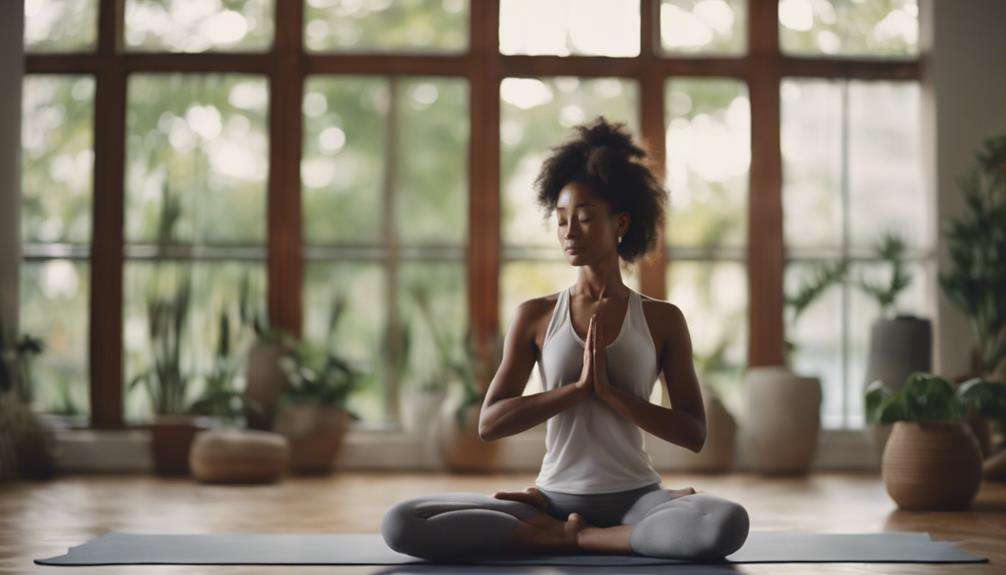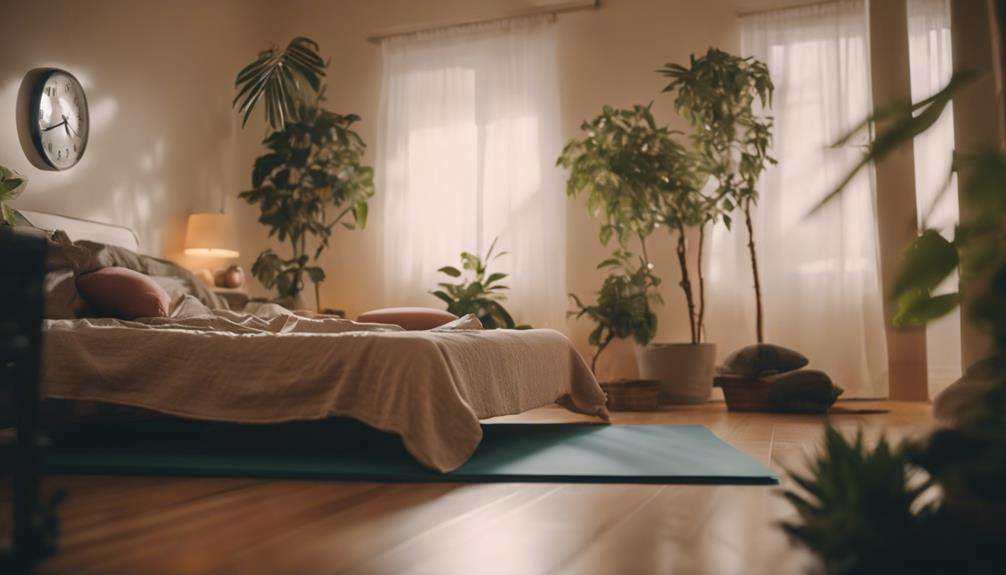You may think bending like a pretzel is just for contortionists, but yoga offers more than just flexibility training.
Imagine a practice that not only enhances your physical flexibility but also nurtures your mental well-being. The secret lies in the balance of body and mind that yoga cultivates, providing a path to self-care that goes beyond the mat.
Through a mindful approach, yoga offers a gateway to a more flexible and resilient you.
Key Takeaways
- Yoga enhances flexibility, preventing injuries and promoting range of motion.
- It supports self-care through muscle strengthening, relaxation, and stress relief.
- Improved flexibility aids in better posture, balance, and overall well-being.
- Yoga fosters a mind-body connection, reducing stress and boosting mental well-being.
Importance of Flexibility in Yoga
Why is flexibility crucial in yoga practice?
Flexibility plays a vital role in yoga as it helps improve your overall range of motion, allowing you to move more freely and comfortably during your practice.
When you work on enhancing flexibility through yoga, you aren't only stretching your muscles but also improving your muscular strength.
This combination of flexibility and muscular strength is essential for maintaining good posture, preventing injuries, and supporting your body in various yoga poses.
Yoga Poses for Enhanced Flexibility
Are you ready to boost your flexibility through specific yoga poses that target different muscle groups?
By incorporating poses like Downward Dog, Cobra, and Pigeon into your practice, you can enhance joint mobility and range of motion.
Challenge yourself with balancing poses such as Tree, Warrior III, and Eagle to improve stability while increasing flexibility over time.
Key Yoga Poses
Enhance your flexibility with these key yoga poses that target different muscle groups and promote increased range of motion in your body.
- Downward Facing Dog: Stretches the hamstrings and calves.
- Forward Fold: Targets the spine and hamstrings.
- Cobra Pose: Opens the chest and stretches the front body.
- Pigeon Pose: Releases tension in the hips and glutes.
- Triangle Pose: Strengthens the legs and stretches the hamstrings, hips, and side body for improved flexibility.
Practice these poses regularly to experience enhanced flexibility and a greater range of motion in your body. Each pose provides unique benefits, helping you to loosen tight muscles and improve overall flexibility.
Benefits of Flexibility
Promote better physical well-being and movement efficiency through the practice of yoga poses that enhance flexibility and range of motion.
Yoga, with poses like Downward Dog, Forward Fold, and Cobra, stretches and lengthens muscles, improving flexibility. This increased flexibility gained from yoga not only reduces the risk of injuries during physical activities and daily movements but also alleviates joint stiffness and muscle tightness.
Regular yoga practice targets key areas such as the spine, hips, and shoulders, enhancing muscle strength and flexibility. The flexibility achieved through yoga not only allows for better posture and balance but also boosts overall physical performance.
Embrace yoga to nurture your body's flexibility and unlock a world of benefits for your physical well-being.
Self-Care Through Yoga
Improve your flexibility and nurture your well-being through the practice of specific yoga poses designed to enhance your physical and mental health. Practicing yoga not only increases flexibility but also promotes self-care by focusing on your body's needs.
Here are some yoga poses that can help you achieve greater flexibility and overall wellness:
- Downward Dog: Stretches the entire body, targeting major muscle groups.
- Warrior II: Strengthens and stretches the legs, arms, and core, improving flexibility and balance.
- Triangle: Opens up the hips and stretches the sides of the body, enhancing flexibility.
- Cobra: Strengthens the back muscles and improves spine flexibility.
- Seated Forward Bend: Stretches the hamstrings and lower back, promoting flexibility and relaxation.
Incorporate these poses into your yoga routine to take care of your body and enhance your flexibility.
Flexibility Benefits for Self-Care
Improving flexibility through yoga can be a great way to care for yourself. It helps to relieve stress and promotes mindfulness, enhancing your overall well-being.
Embrace the benefits of flexibility for a more balanced and self-caring lifestyle.
Flexibility for Stress Relief
Enhance your stress relief and self-care practices by harnessing the power of flexibility through yoga. Yoga practices focusing on flexibility can significantly aid in stress relief by improving overall well-being. Consider the following benefits:
- Increased ankle flexibility enhances mobility and reduces tension.
- Improved muscular strength supports better posture and reduces physical stress.
- Enhanced hamstring flexibility helps release tightness and promotes relaxation.
- Better hip flexibility allows for greater ease in movement and decreases stiffness.
- Increased groin flexibility aids in releasing stored tension and promoting a sense of calmness.
Incorporating these aspects of flexibility into your yoga routine can be a valuable tool in managing stress and enhancing your self-care practices.
Yoga for Mindfulness
Transitioning from the stress-relieving benefits of flexibility, immerse yourself in the practice of yoga for mindfulness, embracing the interconnectedness of breath, movement, and self-awareness. Mindful yoga practice involves focusing on the present moment, enhancing body awareness, and fostering self-compassion.
By directing your attention to the sensations of each movement and the rhythm of your breath, you cultivate a deep connection between your mind and body. This heightened awareness not only increases flexibility but also reduces stress and anxiety.
Embracing a regular yoga routine can lead to improved mental well-being, as you learn to approach yourself with kindness and understanding. Through mindfulness in yoga, you nurture a harmonious relationship between your physical, emotional, and mental aspects, promoting a holistic sense of self-care.
Achieving Physical Flexibility Through Yoga

To increase your physical flexibility significantly, incorporating regular yoga practice into your routine can be highly beneficial. Yoga provides a holistic approach to improving flexibility, offering a range of physical benefits that can enhance your overall well-being. Here are some key ways yoga can help you achieve greater physical flexibility:
- Enhances ankle flexibility, muscular strength, and endurance.
- Improves various types of flexibility like hamstring, lumbar, leg, groin, and hip flexibility.
- Research shows yoga is as effective as traditional exercises in enhancing functional fitness and overall flexibility.
- Athletes benefit from improved flexibility through yoga, leading to enhanced muscle force and performance.
- Reduces musculoskeletal pains and discomfort while promoting general well-being through increased flexibility.
Mental Flexibility and Self-Care
As you explore the mental aspect of yoga, you'll discover how it nurtures mental flexibility and self-care through cultivating self-awareness and mindfulness. Yoga's emphasis on mindful breathing techniques serves as a bridge between the mental and physical, helping you regulate emotions and promote self-care. By integrating these practices into your routine, you can experience the wide-ranging benefits of yoga on your mental well-being.
Regular yoga practice not only fosters emotional resilience and stress management skills but also encourages a positive mindset, reducing negative self-talk and enhancing overall mental health. The cognitive flexibility gained through consistent yoga sessions can lead to improved emotional regulation and a greater sense of well-being. By incorporating these elements into your practice, you pave the way for a more balanced and harmonious approach to self-care.
Embrace the mental flexibility that yoga offers, and watch as it transforms not only your body but also your mind and spirit.
Integrating Yoga for Holistic Flexibility

Enhance your overall well-being by integrating yoga practices that promote holistic flexibility in both body and mind. When you practice yoga, you're nurturing your body and mind simultaneously, fostering a sense of balance and well-being. Here are some ways in which yoga can enhance your flexibility and mental well-being:
- Yoga enhances flexibility: Through a variety of poses and stretches, yoga targets different muscle groups, improving joint mobility and range of motion.
- Improved joint mobility: Regular yoga practice helps increase flexibility by focusing on lengthening and releasing tight muscles.
- Breathing techniques: Yoga incorporates breathing exercises that relax muscles, enabling deeper stretches and enhancing flexibility.
- Stress reduction: Flexibility gained from yoga not only benefits physical health but also contributes to mental well-being, aiding in stress reduction.
- Mind-body connection: Practicing yoga creates a harmonious connection between the body and mind, promoting overall well-being and flexibility.
Integrating yoga into your routine can lead to a more flexible body and a calmer, more balanced mind.
Frequently Asked Questions
Why Is Yoga Important for Flexibility?
Enhanced flexibility from yoga is crucial for you. Increased mobility helps prevent injuries and improves posture. Yoga targets key areas like the spine, hips, and shoulders to boost flexibility, leading to better body alignment and enhanced relaxation.
Why Is Yoga a Form of Self-Care?
Engage in yoga for self-care; it nurtures stress relief, enhances the mind-body connection, and fosters emotional balance. Prioritize your well-being through this holistic practice that promotes mindfulness, self-awareness, and self-compassion.
Why Is Yoga Important for Healthy Life?
Enhanced balance, mindfulness, and increased strength are key benefits of yoga for a healthy life. Improved mobility, stress relief, and relaxation promote overall well-being. Embrace yoga as a holistic practice for inner peace and vitality.
How Does Yoga Benefit Mental Health?
Incorporating yoga into your routine supports mental health through stress reduction, mood enhancement, and anxiety relief. By practicing regularly, you cultivate mindfulness, boost cognitive function, and foster emotional balance, leading to overall well-being.
Conclusion
In conclusion, practicing yoga is like watering a plant – it nourishes your body, mind, and soul, promoting flexibility and self-care. By incorporating yoga into your daily routine, you can cultivate strength, balance, and peace within yourself.
Embrace the journey of self-discovery and growth through yoga, and watch as you blossom into a more flexible and resilient version of yourself. Keep breathing, flowing, and stretching towards a brighter, more flexible future. Namaste.






